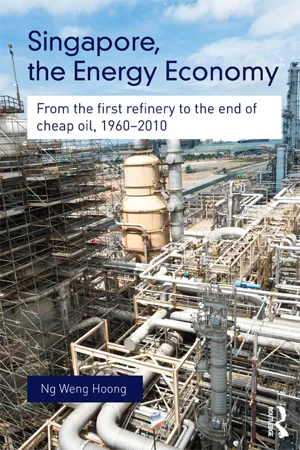
- 288 pages
- English
- ePUB (mobile friendly)
- Available on iOS & Android
Singapore, the Energy Economy
About This Book
Singapore might not have survived the 1960s and prospered thereafter had it not built its economy on the foundations of oil refining, trading and support for oil and gas exploration and production. Cheap oil, sound policies and strong government combined to produce the Singapore economic miracle in its first 50 years of self-rule/independence. With the end of cheap oil, how will Singapore fare and what is the relevance of its model of development for other countries?
Singapore's successful launch coincided with a golden period of cheap energy, and a pro-globalization and free trade environment. These three elements are now under threat from rising energy prices and the global financial crisis which started in 2007 that will leave a lasting impact on the world's political and economic landscape.
If the Singapore model is reaching or has reached its peak, what could take its place? This book poses questions for not just for Singapore planners, but also for anyone interested in modern economics and trade beyond the current era. The book also looks into the numerous subsectors within Singapore's broad energy sector and examines the energy sector's links with the other pillars of its economy: trade, financial, offshore/marine operations, manufacturing and transportation. It considers possible threats and challenges: Singapore's rising energy intensity, its vulnerability to energy supply cut-offs, the likely impact of peak oil, terrorism and environmental / climate issues. It also looks at China's growing investment and role in Singapore's oil and gas industry. The book is a must-read for an excellent insight into Singapore's energy economy, filled with data, information, interviews and analyses previously not available to the public.
Frequently asked questions
Information
Table of contents
- Front Cover
- Singapore, the Energy Economy
- Routledge studies in the modern world economy
- Title Page
- Copyright
- Contents
- List of Illustrations
- Acknowledgments
- Introduction
- 1 Oil refining: the launchpad of the economic miracle
- 2 The regional oil trading and pricing center
- 3 Petrochemical’s wild ride
- 4 Upstream, marine and offshore
- 5 Electricity and power
- 6 Natural gas and LNG
- 7 Bunker and marine fuels
- 8 Sustainable development: clean energy, climate change, energy efficiency, smart grid
- 9 Conclusion: the underrated threat
- Notes
- Selected bibliography
- Index